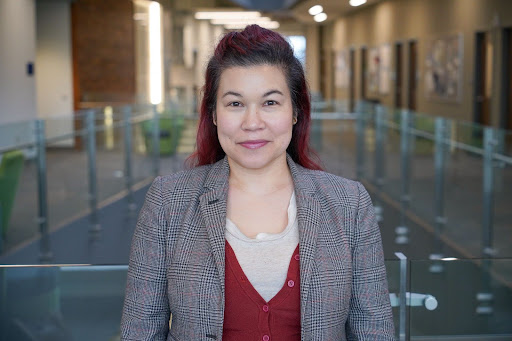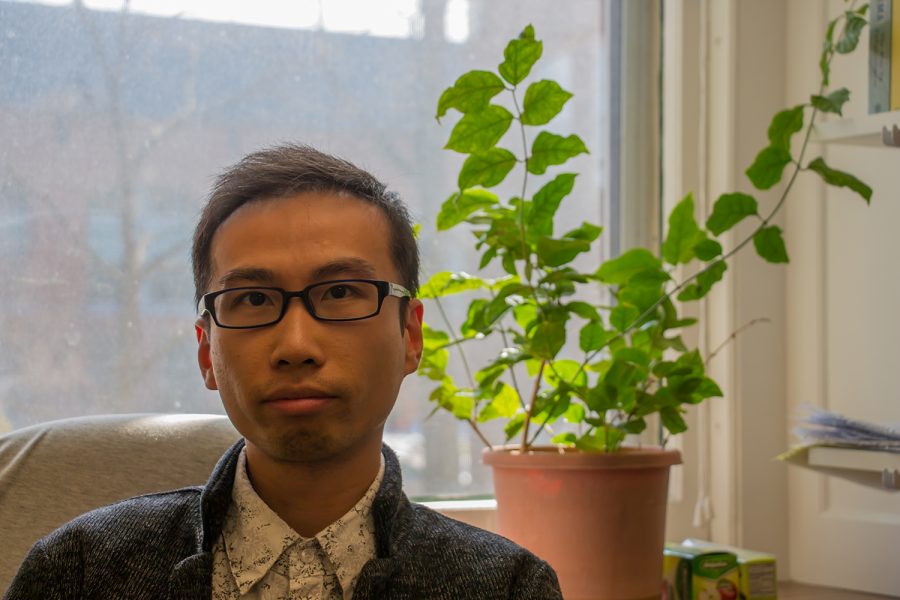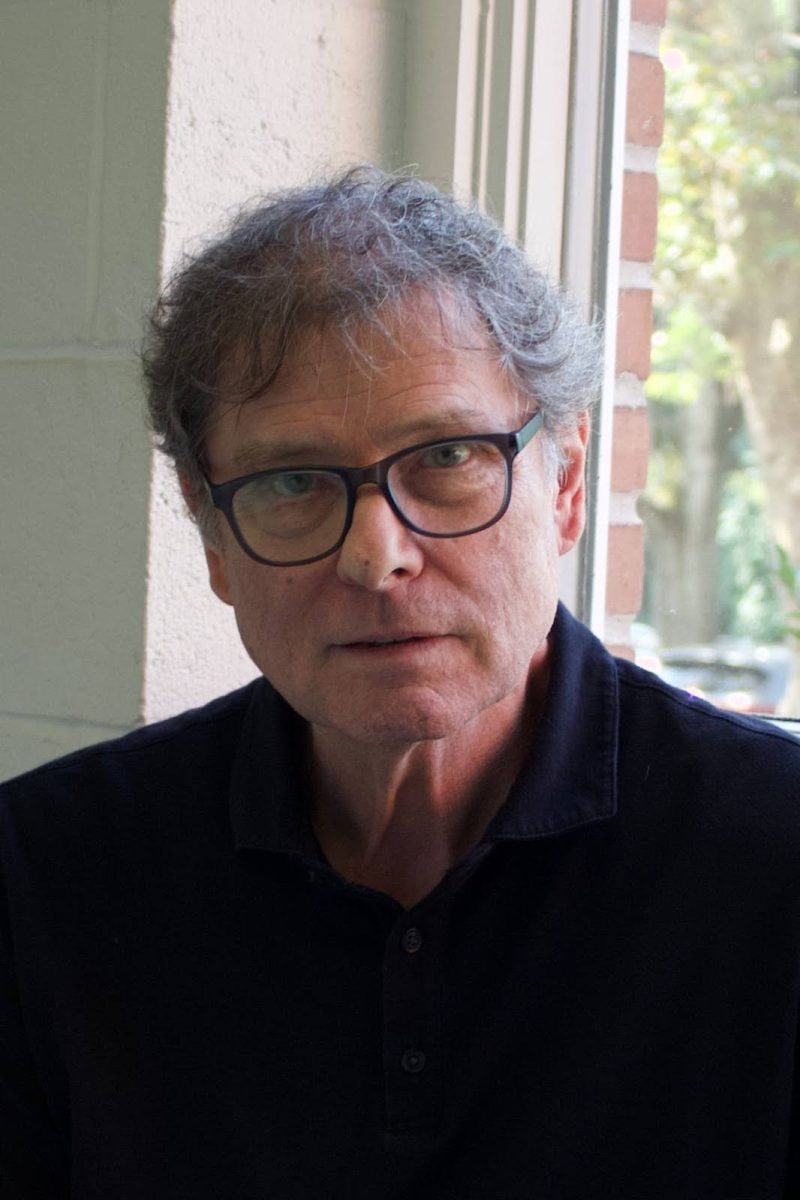
Liz Gray, a poet laureate, professor, bee-keeper, French poet translater, and Moravian Writers’ Conference co-director, has seemingly done it all. She began teaching at Moravian in the Fall of 2022 and currently works as an associate professor of creative writing, while serving as the adviser to The Manuscript, the on-campus literary magazine, and the newly chartered Poetry Club.
Gray attended Vermont College of Fine Arts in Montpelier, VT, where she received her MFA and quite literally stumbled into the prospect of becoming a professor.
“Someone said, as I was walking into a building walking up the stairs: ‘You can teach with an MFA,’ and I was like, ‘Really, you can?’ and that sounded like a pretty good deal,” Gray said.
Within her different disciples, she finds a way to intertwine her passions.
Although she attended fashion school in New York City, which was more based around the “business of fashion,” Gray was more interested in how people presented themselves and why they chose to dress in a certain way. She compares this association to the way she writes about identity.
“In creative writing, we talk a lot about identity and the choices one makes when creating any artistic work. That’s always kind of been the most interesting thing to me, is how stuff comes from who somebody is,” she said.
Before choosing to become a full-time professor, Gray briefly considered a career in event management, which is where her position in the Writers’ Conference comes into play. Gray said she enjoys being the “man behind the curtain,” acting as a stage manager, queueing everything behind the scenes. In this position, she has been able to meet and relate to other writers in different genres, even if they have chosen a different path than herself.
“There’s something about writers who just always come together. I think it may be connected to that committed attention to the human experience,” Gray said.
During high school in Ardmore, PA, Gray studied both French and Spanish, and she completed a six-week program in France as a senior, where she honed her language skills. These experiences ignited her interest in translating French poetry into English, which she focused her MFA thesis on.
Her thesis, “The Poetry of What Remains,” involved translations of de Burine from French into English and poems of the poet Ai, who passed away a few years after she finished the translations of her work from English into French.
“The analytical portion contained my personal reflections on the process and ethical boundaries of ‘literary translation,’ which is often more broadly defined than live event translation – especially when it comes to poetry,” Gray said.
Gray recounts the difficulties of translating poetry in the modern age, especially the work of a female surrealist French poet named Claude de Burine. One of de Burine’s poems referenced telegrams, which, at that time, was an extremely modern reference. However, if she translated using those terms, the modernity of the poem may have been missed. Instead, since the poem previously used language in reference to birds, she made the decision to change telegram to the word “tweet” (referencing the social media formerly known as Twitter, now X).
“It’s more like a touchstone for a modern audience, even though, hopefully, she would be okay with me changing that,” Gray said.
Above all, Gray said she enjoys connecting with people, something teaching allows her to do extensively.
“Shepherding students on their educational journeys and also discovering their own voices as writers,” she said.”I feel it’s such a privilege to be able to get a front-row seat to that moment.”
This role also translates to her beekeeping, where she essentially acts as a silent guardian to her hive. She says she’s always felt a natural affinity for bees, especially since she played a honeybee in her second-grade play.
She began beekeeping with her father after he off-handedly said he considered it once, and ever since, she says, “I think of myself as kind of a guardian of the bees.”
Her first paid job, outside of babysitting, was at a gourmet cheese store in the very small town of Narberth, PA. When that store closed, she subsequently worked at a cheese stand in a farmer’s market, working at a total of three cheese stores throughout her life. Although she no longer works in that market, she enjoys cheese-tasting gatherings in her free time, where she tries to match her friends to a cheese and cracker they feel represents them.
Although sometimes she wishes she had received a traditional liberal arts education like Moravian, she believes that is part of the fun of being involved from the other side.
“I am a big believer in making the best decision you have at the moment with the information at your disposal,” Gray said. “And so even though there are times in my life when I perhaps wish I had made different decisions, I feel pretty confident that I made the best decision that I could at that moment.”
At home in Malvern, PA, Gray lives with her husband, her two daughters, a five- and an eight-year-old, a cat named Jared who loves belovingly interrupting her Zoom meetings, and a dog named Watson. Outside of her professional role, she says she looks forward to sharing her love of the writing arts with her children, as they’re now getting old enough to be able to attend performances with her.
Within her extensive past, she says her biggest lesson was learning to give herself grace.
“I think there have been moments that I’ve kind of had to forgive myself for, but also understanding that as an artist, everything is material, right?” she said.
Regarding how she receives her inspiration for writing, she partakes in a literary form of what she calls a form of forest-bathing, combing through other works for ideas and visiting Google images that encapsulate the feeling that she’s trying to create in a work.
Gray’s maiden name is Chang, which she uses as her pen name; she considers herself a free-verse poet. Her chapbook, “Animal Nocturne,” was selected for publication/third place in the Moonstone Press Chapbook contest by Grace Bauer. “Museum of Things” was a semifinalist for the Black River Chapbook contest from Black Lawrence Press in 2021 and was recently named one of the Best Poetry books of the last year (2022-2023) by Ms. Magazine.
Gray is currently working on a project about her third great-grandfather on her mother’s side who died on the Titanic. While watching a documentary about the eight Chinese sailors who were aboard the Titanic, she realized one of them came from the same region as her paternal side in China and used “Chang” (Gray’s maiden name) as his last name when signing onto the ship. Although it is not certain, and the sailors could have been using fake names to avoid rampant discrimination, it is quite possible that both sides of her family had been aboard the Titanic.
Before her third great-grandfather set sail on the Titanic, he had bought a ring for his wife in England. As he was concerned about pickpockets on the ship, he wrote her a letter that said he had bought her a ring but was sewing it to the lining of his coat because he didn’t want to have it stolen.
He unfortunately died of exposure during the sinking, and his jacket and personal items were later returned to his family. Meanwhile, the letter had arrived at his wife’s, who opened the coat and discovered the ring. That ring was Gray’s engagement ring, which she wore every day for four years.
“I wear a replacement because it was over 100 years old when I got it … It started to kind of deteriorate on one side, and I was like, ‘This survived the Titanic … it has to survive me,’” Gray said.

In 2012, Gray was chosen as the Poet Laureate of Montgomery County.
“I spent the year kind of like traveling around the county and doing readings, and a service project is connected to that title,” she said.”My service project was going into artistic spaces and doing workshops there, so that was really fun.”
In addition to that accomplishment, Gray is a part of an improvised poetry group called No River Twice, where the poems themselves aren’t improvised, but the readings are. The name of the group stems from the concept of never being able to step in the same river twice, in the same way that their readings could not be repeated.
And now, she steps into a new ever-changing river at Moravian.
“I am very happy being at Moravian. And I think that in a lot of ways, there are a lot of really wonderful opportunities for students who are willing to take advantage of those opportunities,” Gray said.







